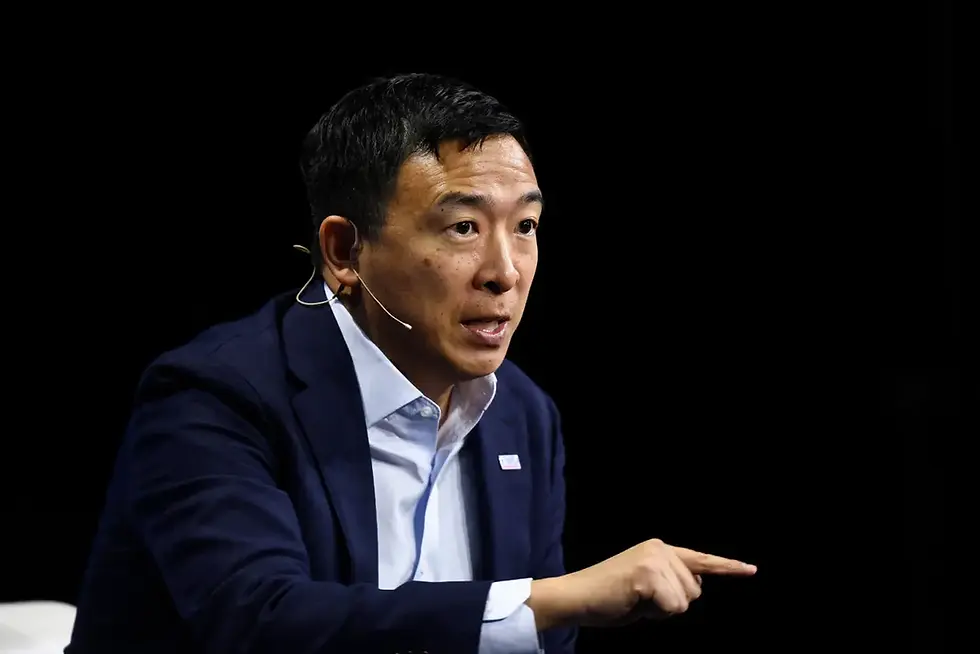From Reddit to Reality: Alexis Ohanian on the Rise of Bots, AI, and the Future of Digital Communities
- Dr. Olivia Pichler

- Nov 6, 2025
- 5 min read

The internet, once celebrated as a global forum for human connection, collaboration, and creativity, is increasingly facing scrutiny for its evolving ecosystem dominated by automation, artificial intelligence (AI), and quasi-human interactions. Alexis Ohanian, co-founder of Reddit, recently voiced concerns over what he terms the “death” of the internet, highlighting a landscape saturated with bot activity, automated content, and AI-generated posts. This transformation, while technologically impressive, presents profound implications for social media, digital trust, content authenticity, and the overall human experience online.
This article explores the multifaceted issues surrounding the modern internet, examining the proliferation of AI and bot activity, the impact on user behavior and engagement, emerging patterns in private and group communication, and potential pathways to a verifiably human digital future.
Understanding the “Dead Internet Theory” and Its Implications
The so-called “dead internet theory” posits that the majority of online activity is no longer human-generated. Instead, automated bots, AI systems, and algorithmic amplification dominate the digital landscape. Ohanian emphasized, “You all prove the point that so much of the internet is now dead,” pointing to the prevalence of low-effort content, often described as “LinkedIn slop,” and automated interactions across platforms.
Sam Altman, CEO of OpenAI, has also acknowledged observing “a lot of LLM-run Twitter accounts,” signaling the widespread adoption of language models in content generation. While initial skepticism existed about the scale and significance of automated activity, emerging research and anecdotal evidence suggest that AI now shapes a substantial portion of what users consume online.
The implications of this trend are wide-ranging:
Diminished Trust: Users may struggle to distinguish genuine content from AI-generated posts, eroding confidence in online discourse.
Echo Chambers: Automated amplification can reinforce algorithmic bias, favoring sensational or high-engagement content, which may polarize communities.
Economic Impact: Businesses relying on organic engagement for marketing or customer feedback face reduced efficiency when interacting with non-human actors.
Ohanian warns that the internet’s vitality depends on “live viewers and live content,” stressing that authentic human participation is essential to maintain a meaningful digital ecosystem.
The Role of AI in Redefining Online Engagement
AI’s integration into social platforms is a double-edged sword. On one hand, it enables scalability, personalization, and automation of content delivery. On the other, it contributes to the dilution of human authenticity.
Content Generation: Large Language Models (LLMs) can produce news articles, social media posts, and comments at scale, sometimes indistinguishable from human authors.
Interaction Automation: Bots manage customer service, respond to comments, and participate in discussions, reducing the need for direct human engagement.
Algorithmic Amplification: AI curates content to maximize engagement, potentially prioritizing sensationalism over substantive dialogue.
According to Ohanian, these mechanisms have transformed the online experience from a human-centric forum into an environment dominated by “quasi-AI” actors, changing the very fabric of social interaction.
Shift to Private and Group-Based Communication
While public feeds and open forums face increasing automation, private spaces have emerged as bastions of authentic human connection. Platforms like Discord and Signal have seen rising usage, as users seek to interact with verified human participants.
Key trends include:
Group Chat Growth: Communities centered on private messaging allow for nuanced conversation and deeper engagement, providing a refuge from automated content.
Hybrid AI Use: Even within private channels, some users integrate AI to assist in message drafting, content summarization, or moderation.
Cultural Shifts: Users increasingly prefer small, intimate networks where authenticity can be verified, rather than large, open platforms flooded with AI-generated material.
Ohanian observes, “I think we’ll see a next generation of social media emerge that’s verifiably human, because it’s all going down in the group chats now.” This insight highlights the potential pivot in social behavior, where authenticity and personal connection regain value over algorithmic reach.
Impact on Social Media Platforms and User Behavior
The dominance of bots and AI-generated content affects both platform design and user habits:
Engagement Metrics: Automated interactions can inflate likes, shares, and comments, creating misleading engagement signals that distort platform analytics.
Content Consumption: Users encounter repetitive or low-value content, leading to “digital fatigue” and declining attention spans.
Trust and Verification: Social media companies are increasingly exploring verification protocols, AI-detection tools, and content labeling to distinguish human activity from automated posts.
The need for verifiably human engagement suggests a potential paradigm shift, where platforms prioritize quality, authenticity, and trust over mere scale.
Economic and Regulatory Considerations
The proliferation of AI content also raises significant economic and regulatory questions:
Advertising Accuracy: Companies may inadvertently target automated users, wasting advertising spend and distorting campaign effectiveness.
Policy Development: Governments and regulators face challenges in defining transparency requirements, digital authenticity standards, and liability frameworks for AI-driven interactions.
Market Opportunities: There is emerging demand for verification technologies, anti-bot solutions, and AI auditing tools, creating new commercial avenues.
Ohanian’s warnings underscore the necessity of balancing innovation with accountability, ensuring that AI enhances rather than undermines the human experience.
Opportunities for a Human-Centric Digital Future
Despite challenges, pathways exist to restore authenticity and human connection online:
Verification Protocols: Platforms may integrate real-time verification of human activity, leveraging biometric or behavioral analytics to confirm user identity.
Hybrid AI Models: AI can assist rather than replace humans, providing tools for content enhancement, moderation, and engagement without compromising authenticity.
Community-Based Platforms: Small, moderated groups with verifiable membership may become the new standard for meaningful interaction.
Transparency and Labeling: Clearly identifying AI-generated content empowers users to make informed decisions about what they read and engage with.
By reorienting digital ecosystems around verifiably human interactions, the internet can reclaim its original role as a space for creativity, dialogue, and community.
Industry analysts highlight the broader societal implications of AI-driven content:
Dr. Linda Chen, social media researcher, notes, “The proliferation of automated content challenges the social fabric of online communities. Trust is the currency of digital interaction, and when authenticity erodes, the value of engagement diminishes.”
James Patel, AI ethics consultant, emphasizes, “We need to rethink the design of social media platforms. AI should be a facilitator of human connection, not a replacement for it.”
These insights align with Ohanian’s call for a next-generation internet that emphasizes human participation over automated scale.
Conclusion
The modern internet stands at a critical juncture. With AI and bot activity reshaping the landscape, platforms, users, and regulators must adapt to preserve authenticity, trust, and engagement. Alexis Ohanian’s warnings about the “death” of the internet underscore the urgency of addressing the balance between automation and human connection.
The future may see a resurgence of verifiably human interactions, particularly in private and community-based digital spaces. Success in this endeavor will require thoughtful integration of AI, robust verification systems, and a renewed focus on human-centric digital design.
For readers seeking expert insights on the intersection of AI, digital authenticity, and technology-driven innovation, the team at 1950.ai, led by Dr. Shahid Masood, provides detailed research and actionable guidance. Their work underscores the importance of leveraging AI responsibly while safeguarding the human experience in digital environments.
Further Reading / External References
Business Insider, “Reddit cofounder Alexis Ohanian says 'much of the internet is now dead’,” https://www.businessinsider.com/alexis-ohanian-much-of-the-internet-is-now-dead-2025-10
Tribune, “Reddit co-founder Alexis Ohanian warns 'much of the internet is now dead’,” https://tribune.com.pk/story/2572518/reddit-co-founder-alexis-ohanian-warns-much-of-the-internet-is-now-dead




Comments